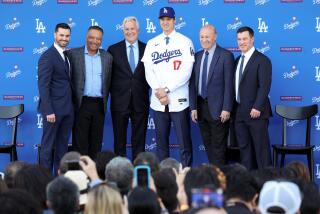Ken Burns pitches into the ‘Tenth Inning’
Ken Burns stands behind home plate at Dodger Stadium, unsuccessfully trying to corral his preternatural boyish grin. He plucks at the webbing of his Kirby Puckett-endorsed mitt before strolling to the pitcher’s mound.
Toeing the rubber, the 57-year-old Burns hurls a well-aimed pitch to Dodgers catcher Brad Ausmus, then leaves the field to polite applause.
“That was a strike all the way,” he says, beaming, “and [Dodgers manager] Joe Torre gave me the thumbs-up.”
The evening has just begun for the hardest-working documentary filmmaker this side of Michael Moore. Burns schmoozes with broadcaster Vin Scully in the press box, conducts a spirited Q-and-A inside the luxury suite of corporate patron Bank of America, then heads to seats beyond the left field foul pole to watch the game with devoted viewers of local PBS affiliate KCET.
Accompanied by co-director and co-producer Lynn Novick, Burns’ August appearance in L.A. is part of the bang-the-drum promotion for “Tenth Inning,” their two-part, four-hour documentary about the sport Burns calls “quintessentially American.” It airs Sept. 28 and 29 on PBS.
If the pairing of Burns and the national pastime seems familiar, it’s because “Tenth Inning” is a postscript (an extra inning, if you will) to “Baseball,” Burns and Novick’s nine-part, 18 1/2-hour epic from 1994. The latter was a valentine to the game’s sprawling history, from its emergence in the 19th century to its role as a social force after Jackie Robinson’s breakthrough in the 1940s to its exalted position within the sports-entertainment-media nexus.
In “Tenth Inning,” Burns and Novick focus on events since the early 1990s, including the 1994 strike that forced the cancellation of the World Series and derailed the game’s popularity; the home-run chases of Mark McGwire, Sammy Sosa and Barry Bonds; the rise of Latino and Asian players; and the cloud of steroid and performance-enhancing-drug use.
“With the exception of the 1940s and Jackie Robinson, you’d be hard pressed to find two more consequential decades than the ‘90s and the aughts, in terms of the game and by extension the country,” Burns says.
Baseball, Burns notes, is “a barometer of the ongoing American narrative.” The smashing of the game’s home-run records coincided with what Burns calls “the rising tide of the ‘90s and the unlimited confidence that the good times would never end.” The revelations and disgust over steroid use were the “screeching of brakes concurrent with other things happening in this country since 9/11.”
So too the growing presence of Latino ballplayers (between 25% and 30% of all major leaguers) overlaps with the recent debate over immigration. Burns, who faced criticism for ignoring the role of Hispanic Americans in his World War II documentary, says, “Now you have to look at baseball in black and white and brown.”
The contemporariness seems to have liberated Burns as a filmmaker. Much of “Baseball,” like “Civil War,” relied on his trademark technique of slowly panning across still photographs, acoustic strings a-twanging in the background. (The tone is so ubiquitous that Apple dubbed the iPhoto and iMovie applications that mimic this “the Ken Burns Effect.”)
In “Tenth Inning,” Burns and Novick eschewed black-and-white imagery (and banjos) for color photos and game highlights, much of which was licensed from Major League Baseball. They journeyed to the Dominican Republic to film scenes at the Dodgers’ Campo Las Palmas academy and capture the Latino beisbol experience.
Meanwhile, the soundtrack features Public Enemy, the Beastie Boys and Bruce Springsteen. Music from Tower of Power is an insider’s nod to former band member Victor Conte, who formed the BALCO company at the center of the steroids scandal.
Newcomers Torre, ESPN’s Howard Bryant, MSNBC’s Keith Olbermann and Sacramento Bee columnist Marcos Breton join Burns’ cast of familiar voices (narrator Keith David) and talking heads (columnist George Will, historian Doris Kearns Goodwin).
Torre emerges as one of the film’s sage touchstones. Torre has a “visual memory of events that put you right back in time,” Novick says. “He has an emotional relationship with the game that radiates out of every pore.”
The game changed
After the original airing of “Baseball,” Burns had no plans to make a sequel. He began to muse about a follow-up when his beloved Boston Red Sox, bereft of a World Series championship since 1918, broke through in 2004. (Novick is a Yankees fan, which makes their long partnership a triumph of hardball harmony.)
But it was the issue of steroids, Burns said, that “made me want to do another film.” The sight of absurdly muscled ballplayers, their XXXXL-size uniforms straining at the seams, was a video game come to life that altered the pitcher-batter dynamic and forever sullied the sport’s image.
“The first film felt incomplete with everything that happened afterward,” Novick says. “The film ended, but the story of baseball kept on going.”
Through his production company, Florentine Films, Burns had mapped out a 10-year schedule of projects with partners PBS and Bank of America. But when he approached them about doing a sequel, they quickly acquiesced. After all, “Baseball” won an Emmy Award and attracted 43 million viewers, making it the most-watched series in PBS history.
“Ken’s instincts are keenest when it comes to storytelling and when there’s another chapter to tell,” PBS programming chief John Wilson says. “Baseball is an ongoing cultural phenomenon that continues to evolve.”
During three years of production, Burns and Novick leaned heavily on editor Craig Mellish and writer-producer David McMahon (who is Burns’ son-in-law). That freed Burns to concentrate on his other job: hustling for funding.
Besides financing from BofA and the Corporation for Public Broadcasting, Burns cobbled together the reported $5-million budget with contributions from institutional and private family foundations.
“He keeps up a blistering pace,” McMahon says of Burns, who lives with his second wife and their daughter in Walpole, N.H. “Then he comes into the editing room and has the ability to remain intensely focused on the task at hand for however long it takes to get the job done.”
His workload is daunting. On tap for PBS are multi-part documentaries about Prohibition (2011), which Burns calls “the original culture war,” and the Dust Bowl (2012), which he describes as “the greatest man-made ecological disaster in American history, superimposed over the worst economic cataclysm in world history.”
Beyond that are films about the Roosevelts (Teddy, Franklin and Eleanor), the Vietnam War, the Central Park jogger case and a history of country music.
Burns doesn’t rule out revisiting baseball again. “When the Chicago Cubs win the World Series,” he quips, referring to that team’s century-long championship drought, “we’ll get started on ‘Eleventh Inning.’”
calendar@latimes.com
More to Read
Are you a true-blue fan?
Get our Dodgers Dugout newsletter for insights, news and much more.
You may occasionally receive promotional content from the Los Angeles Times.






